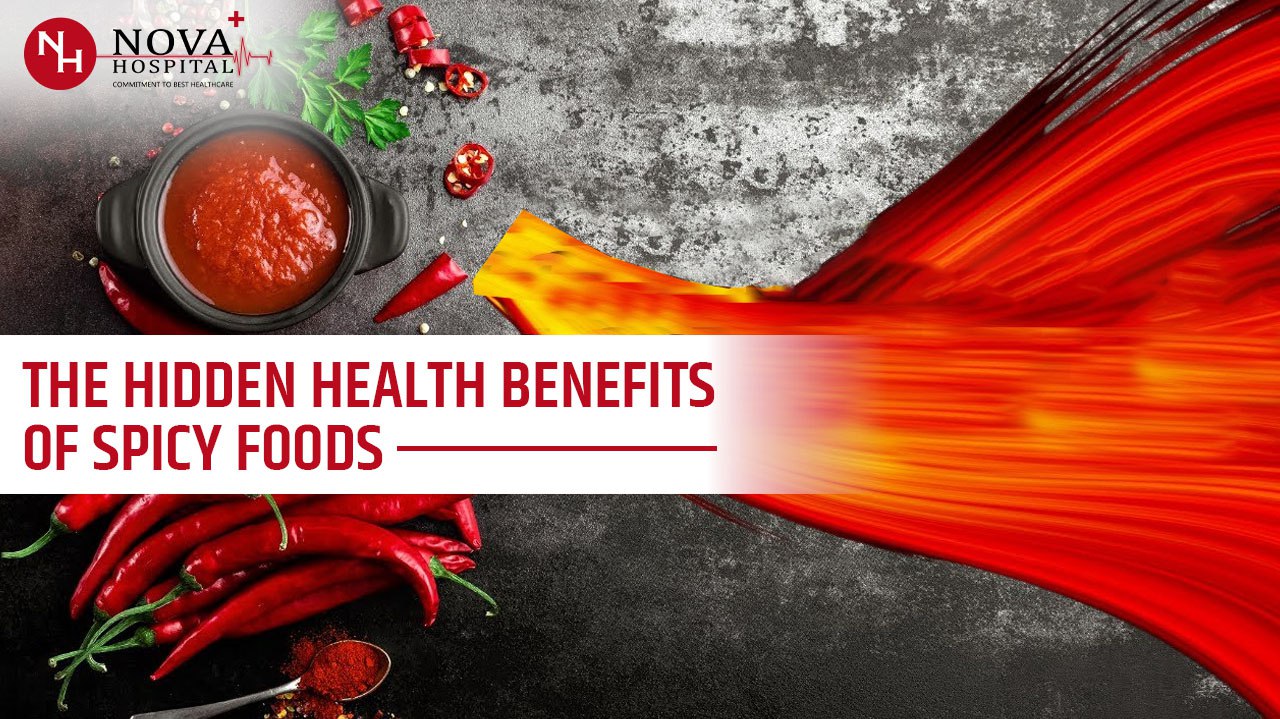The Hidden Health Benefits of Spicy Foods – Nova Hospital
Have you ever taken a bite of spicy food and felt your taste buds come alive with a fiery sensation? Spicy foods have been a part of human cuisine for centuries and are popular in many cultures worldwide.
However, did you know that there are hidden health benefits to consuming spicy foods? In this article, we’ll explore the various components that make spicy foods spicy and their effects on the human body. We’ll also take a closer look at the many health benefits associated with consuming spicy foods, including improved digestion, weight loss, cardiovascular benefits, pain relief, and even cognitive benefits. But before we dive in, let’s take a quick look at what exactly we mean by spicy foods and their historical background. Let’s get started!
Components of Spicy Foods and Their Benefits
Capsaicinoids are the active compounds responsible for the spiciness of certain foods, such as chili peppers. Capsaicinoids stimulate the sensory neurons in our mouths and cause the sensation of heat or burning. However, capsaicinoids don’t just affect our taste buds – they also have several beneficial effects on our bodies.
Other compounds found in spicy foods include flavonoids, carotenoids, and phenolic acids. These compounds have been shown to have antioxidant and anti-inflammatory properties, which can help protect our bodies against cellular damage and disease.
When we consume spicy foods, the compounds in these foods interact with our bodies in various ways. For example, capsaicinoids can cause our bodies to release endorphins, which are natural painkillers. They can also increase our metabolic rate, leading to potential weight loss benefits. Additionally, the anti-inflammatory properties of some of these compounds can help alleviate certain types of pain and promote gut health.
Overall, the components found in spicy foods have a wide range of potential health benefits. However, it’s important to keep in mind that consuming too much spice can also have potential risks, which we’ll cover in more detail later in this article.
Top Health Benefits of Spicy Foods
Certainly, here are some of the health benefits associated with consuming spicy foods:
- Improved Digestion and Gut Health: The compounds in spicy foods, such as capsaicinoids and phenolic acids, can help promote digestion and reduce inflammation in the gut. Studies have shown that consuming spicy foods may help alleviate symptoms of irritable bowel syndrome (IBS) and improve overall gut health.
- Anti-inflammatory Properties: Many of the compounds found in spicy foods have been shown to have anti-inflammatory properties, which can help reduce inflammation throughout the body. Chronic inflammation has been linked to a range of health problems, including heart disease, diabetes, and cancer.
- Weight Loss and Metabolic Benefits: Capsaicinoids found in spicy foods have been shown to increase metabolic rate, which can lead to potential weight loss benefits. Additionally, some studies have suggested that consuming spicy foods can help suppress appetite and reduce calorie intake.
- Cardiovascular Benefits: The anti-inflammatory properties of spicy foods may also have benefits for cardiovascular health. Studies have suggested that consuming spicy foods may help lower blood pressure, reduce cholesterol levels, and improve blood vessel function.
- Pain Relief and Analgesic Properties: The release of endorphins triggered by capsaicinoids can provide natural pain relief. Capsaicinoids have been used in topical creams to alleviate pain associated with conditions such as arthritis, shingles, and nerve damage.
- Anti-cancer Properties: Some studies have suggested that the compounds found in spicy foods may have anti-cancer properties. For example, capsaicinoids have been shown to induce apoptosis, or programmed cell death, in cancer cells.
- Cognitive Benefits: Some research has suggested that consuming spicy foods may have cognitive benefits, such as improved memory and cognitive function.
Overall, the health benefits associated with consuming spicy foods are numerous and varied. However, it’s important to keep in mind that these benefits are not a substitute for a healthy, balanced diet and lifestyle.
Precautions and Risks
Sure, here are the potential risks and precautions associated with consuming spicy foods, in shorter paragraphs:
- Gastrointestinal Issues: Consuming too much spice can cause gastrointestinal issues such as heartburn, acid reflux, and stomach ulcers. If you have a pre-existing gastrointestinal condition, it’s important to consume spicy foods in moderation or avoid them altogether to prevent further irritation.
- Allergic Reactions: While rare, some individuals may experience an allergic reaction to certain compounds found in spicy foods. Symptoms may include hives, swelling, and difficulty breathing. If you experience any of these symptoms after consuming spicy foods, seek medical attention immediately.
- Interaction with Medications: Some medications, such as blood thinners and anti-inflammatory drugs, may interact with the compounds found in spicy foods. If you are taking any medications, it’s important to speak with your healthcare provider before incorporating spicy foods into your diet.
- Skin Irritation: Handling spicy peppers or preparing spicy foods can cause skin irritation or burns. It’s important to wear gloves and handle spicy foods with care to prevent irritation or burns.
- Dental Health: Spicy foods can cause temporary damage to tooth enamel, especially if consumed in large quantities. It’s important to practice good dental hygiene and consume spicy foods in moderation to prevent damage to your teeth.
Overall, while consuming spicy foods can provide numerous health benefits, it’s important to be aware of the potential risks and precautions associated with these foods. If you have any concerns or pre-existing medical conditions, speak with your healthcare provider before incorporating spicy foods into your diet.
Conclusion
In conclusion, the health benefits of consuming spicy foods are numerous and varied. The active compounds found in spicy foods, such as capsaicinoids, flavonoids, and phenolic acids, can provide benefits such as improved digestion, weight loss, cardiovascular health, pain relief, and potential anti-cancer properties.
However, it’s important to keep in mind that consuming too much spice can also have potential risks and side effects, especially for individuals with pre-existing gastrointestinal conditions.
It’s important to listen to your body and consume spicy foods in moderation, particularly if you have a sensitive digestive system.
Overall, incorporating spicy foods into your diet can be a delicious and healthy way to boost your health and well-being. From adding a pinch of cayenne pepper to your morning smoothie to enjoying a spicy stir-fry for dinner, there are many ways to spice up your meals and reap the benefits of these flavorful foods.

